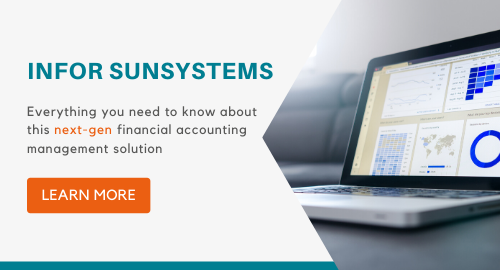In a study conducted on 3000 accountants worldwide by Sage People in 2018, 67 per cent of the participants stated that they "have their heads in the cloud"; and more than half of them have already adopted cloud-based solutions. As cloud computing is becoming more mainstream, early adopters are now reaping its benefits. It is time for your accounting function to be transformed digitally with cloud accounting software.

Read more: 7 worst financial fiascos caused by Excel errors
What is cloud accounting software and how can it benefit organisations?
Cloud accounting software is an application that runs on remote servers, allowing users to access accounting functionalities via any common web browser.
There are two typical cloud accounting formats:
- Hosted applications: With this option, businesses run their own accounting software on remote servers. Users are given access to the solution via a web browser.
- Software as a Service (SaaS): Businesses handle their accounting function using the vendor's software and database via the Internet. Online banking, social media platforms, and Google email accounts are some of the most popular examples for the SaaS business model.
Read more: Automating financial forecast for hotels with cloud systems
Cloud accounting vs. Traditional accounting
Traditional (on-premise) accounting systems require businesses to set up physical data centres. This, in turn, results in hefty upfront investment in hardware, IT personnel as well as time and effort to install and maintain the solution.
Cloud-based accounting solutions, on the other hand, store businesses' data in the cloud. Users can obtain financial information anytime, anywhere as long as they are connected to the Internet.
Cloud accounting software can be most beneficial for start-ups and SMEs due to its scalability in addition to the powerful processing power (which used to be available only to enterprises with an impressive budget).
From a simple bookkeeping capability to sophisticated forecasting and budgeting functions, today's cloud accounting systems have drastically evolved to accommodate every business need. Cloud accounting also offers a straightforward pay-as-you-go method and a highly secure environment to protect organisations online.
The 24/7 "always-on" connection between accountants and their clients is essential in this day and age, allowing both parties to keep a close watch on potential problems as well as enabling accountants to provide timely advice to their clients.
Benefits of having cloud accounting software
Cloud accounting software eliminates the need for manual system installation. Users can tackle their day-to-day activities from any workstation, at any time. All data is also automatically saved in the cloud and can be quickly retrieved.
Furthermore, the cloud-based system can be scaled up or down in an instant, has a fixed monthly subscription fee, and requires no upfront capital expenses making cloud accounting the most cost-effective solution for businesses regardless of size.
Read more: Must-haves of accounting software for non-profit organisations
In addition to these advantages, cloud accounting software also possesses these five exceptional benefits:
1. Automatic backup, updates, maintenance
Cloud accounting providers will take the responsibility of maintaining the periodic software backups and updates, freeing the organisations up for other mission-critical priorities. What's more, the maintenance and upgrades are carried out simultaneously across the organisation.
Therefore, instead of waiting for weeks or months for the latest iteration, cloud accounting software provides businesses with endless possibilities and unparalleled agility. The maintenance is already included in the monthly subscription fee.
2. Acquire real-time data
Financial transactions are automatically updated, allowing users to keep track of their business performance in real time. Cloud accounting systems provide a quick snapshot into the business' most recent activities, thus, creating a more precise picture of how well the company is doing and empowering managers to make more informed decisions based on the latest financial situation.
Furthermore, users can easily and quickly locate invoices, bills, and missed payments, which helps businesses to maintain a healthy relationship with their suppliers, distributors, employees, and other business partners.
3. Take over control of who can access the data
Managers can add multiple users; each is given authority to manage a specific function. This allows managers to easily monitor people's activities and access them according to their responsibilities and level of authority. Once they have their access granted, users can only view information within their role, preventing them from viewing sensitive information when they should not.
4. Safe from natural disasters and security threats
Cloud accounting software is frequently backed up and continuously monitored, and the chance of a security breach occurring is very little.
On-premise accounting systems require businesses to set up a physical centre to house all the hardware. In case of a disaster, such as a heavy storm, fire, or thievery, the equipment can get damaged, destroyed, or stolen; the same goes for any data stored inside. The recovery process will be lengthy and costly.
Data stored in cloud accounting software is up "in the cloud" and can be retrieved anytime without any physical obstructions. Thus, organisations can function normally despite the calamity.
Read more: Data protection – Are passwords obsolete?
5. Improve collaboration
With the traditional accounting method, it is common for executive leaders/ business owners to sparingly communicate with the accountants unless when it is time for tax returns. The lack of frequent communication can lead to a pile of work and/or extended time to get financial reports and budgets approved.
Cloud accounting software ensures leaders regularly collaborate with accounting professionals to avoid any mishaps as well as ensure the process of tax filing happens smoothly.
Accounting practices have seen progressive changes in recent years. Not only cloud computing but Artificial Intelligence (AI) is also starting to penetrate the accountant's daily life in the form of smart assistants.
The best approach is to welcome these emerging technologies with an open mind. Stay calm, stay focused, and do not let the fear of change cloud your judgement.
 English
English  Vietnamese
Vietnamese 


